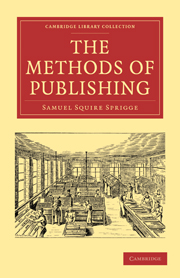Book contents
- Frontmatter
- Contents
- THE SOCIETY OF AUTHORS (INCORPORATED)
- PREFACE
- CHAPTER I LITERARY PROPERTY
- CHAPTER II THE VALUE OF ITS DIFFERENT FORMS
- CHAPTER III SALE, OUT-RIGHT AND LIMITED
- CHAPTER IV THE HALF-PROFIT SYSTEM
- CHAPTER V THE ROYALTY SYSTEM
- CHAPTER VI PUBLISHING ON COMMISSION
- CHAPTER VII ADVERTISEMENT
- CHAPTER VIII AUTHOR'S CORRECTIONS
- CHAPTER IX AGREEMENTS, MORE OR LESS
- CHAPTER X REMAINDER-SALES
- CHAPTER XI CONCLUDING REMARKS
- APPENDIX: THE SOCIETY OF AUTHORS. (INCORPORATED.)
- CONDITIONS OF MEMBERSHIP
CHAPTER XI - CONCLUDING REMARKS
Published online by Cambridge University Press: 29 August 2010
- Frontmatter
- Contents
- THE SOCIETY OF AUTHORS (INCORPORATED)
- PREFACE
- CHAPTER I LITERARY PROPERTY
- CHAPTER II THE VALUE OF ITS DIFFERENT FORMS
- CHAPTER III SALE, OUT-RIGHT AND LIMITED
- CHAPTER IV THE HALF-PROFIT SYSTEM
- CHAPTER V THE ROYALTY SYSTEM
- CHAPTER VI PUBLISHING ON COMMISSION
- CHAPTER VII ADVERTISEMENT
- CHAPTER VIII AUTHOR'S CORRECTIONS
- CHAPTER IX AGREEMENTS, MORE OR LESS
- CHAPTER X REMAINDER-SALES
- CHAPTER XI CONCLUDING REMARKS
- APPENDIX: THE SOCIETY OF AUTHORS. (INCORPORATED.)
- CONDITIONS OF MEMBERSHIP
Summary
Such are the usual methods of publishing. Such are the practices prevalent therein. Such is, and has been for years, the way in which a property is disposed of, which brings to its possessors an aggregate income of millions annually.
What fraction of this income in the aggregate reaches the creators it is impossible to guess, but, after allowing for the fact that certain authors are in a position to make comparatively good terms for themselves, it can be confidently stated that the fraction is a small one.
The best terms exacted for himself by the most popular novelist of the day are only good because they are better than those obtained by anyone else: they do not represent his due share of the profits of the work he has created.
I do not think that the manner in which the methods of publishing have been here considered can be called by anyone other than fair. Actual documents upon which publishing transactions have been entered into have been used, and actual figures arising out of those documents.
The following are the broad conclusions that it is thought may be drawn from them.
(1) The method of outright sale is open to but one objection, but that is a radical one. The prices offered are inadequate.
(2) Any method of limited sale is better, but it is not often that the author gets an opportunity of issuing his works in this manner.
The most usual suggestion under this method is, that for a certain sum, he should cede his copyright until a certain number of copies have been sold.
- Type
- Chapter
- Information
- The Methods of Publishing , pp. 106 - 112Publisher: Cambridge University PressPrint publication year: 2010First published in: 1890



